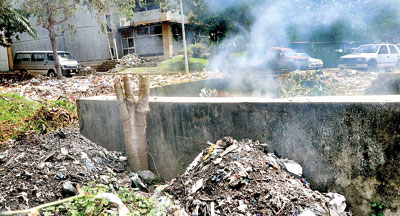News
Apathy by state institutions contributing to deadly dengue
By Nadia FazlulhaqLeniency by health authorities to state institutions that are negligent about mosquito breeding grounds, has contributed towards this year’s dengue outbreak that has killed at least 75 people so far.
This was revealed at this week’s Presidential Task Force meeting where it was pointed out that of the 385 state institutions in the country, only 23 had appointed dengue-control committees to look into the prevention of mosquito breeding sites within their premises.

Health Ministry secretary Dr. Ravindra Ruberu
Of the 45 ministries, only nine — National Languages, Postal and Telecommunication, Fisheries, Finance, Defence, State Resources and Entrepreneur Development, Ports and Civil Aviation, Health and Power and Energy ministries — have taken preventive measures, while shockingly ministries such as Education, Environment and Local Government that are supposed to play a key role in curbing the deadly menace had failed in their duties, it was further revealed.
Despite the Presidential Secretary’s directive to heads of state institutions to appoint dengue committees to oversee offices and project sites that come under their purview and submit monthly reports, of the 90 departments in the country, 86 of them had not complied with the directive.
It was also revealed that of the 33 state authorities only the Machinery and Equipment Authority had appointed a dengue-control committee and of the 30 boards only the Ceylon Electricity Board had complied with the order while the Building Materials Corporation was the only corporation to do so among the 24 state corporations. Only six of the 142 state project agencies set up dengue-control committees while of the 21 commissions only the National Transport Commission followed the directive.
Following Monday’s emergency meeting held due to the high number of deaths and 15,243 cases reported for this year alone, June 25 to July 24 has been declared dengue eradication month
“All institutions were told to take immediate steps and health officers were instructed to take strict measures against government institutions that have failed to carry out orders,” Health Ministry secretary Dr. Ravindra Ruberu said.The Sunday Times learns that the Presidential Task Force had learnt that a number of government institutions in residential areas had breeding sites but local health authorities had only inspected residences.
Dr. Ruberu said a senior official from the Presidential Secretariat will be tasked to monitor all state institutions.
He said plans were afoot to provide more vehicles for garbage removal and provide more manpower to local authorities as they had to be more responsible in the fight against dengue.
Dr. Rubero said the Health Ministry will be supported by the Defence Ministry in its campaign against dengue by deploying military personnel for dengue control work especially in state institutions and abandoned properties.“Military personnel will assist health officers to identify breeding spots and get the public to clean such premises,” Dr.Ruberu said.
Stinging attack by �health unions
Health unions charge local authorities are not playing their part in the control of dengue.
“Poor garbage disposal by local government bodies has led to the breeding of dengue mosquitoes in disposed containers like yogurt cups, coconut shells,” Public Health Inspectors’ Association head Upul Rohana said.

The state of a State institution: Army, police and PHI officials who had entered the Isurupaya building premises that houses the Education Ministry on Friday had issued an ultimatum of three days to clear up this open garbage pit . Pic by Susantha Liyanawatte
He said authorities should pay more attention to the Colombo district as it is densely populated and has a poor garbage disposal system.
Meanwhile Health Services Trade Union Alliance president Saman Ratnapriya said that hospitals in high risk areas should be better equipped with facilities such as separate wards for dengue patients and be vigilant about keeping the hospital premises clean and mosquito-free.
1,000 breeding sites in the vicinity of FEB
Following the death of a 39 year-old female employee of the Foreign Employment Bureau (FEB) in Battaramulla and about 30 others being stricken by fever, an anti-dengue campaign revealed more than 1,000 breeding spots in other state agencies in the vicinity.
Battaramulla’s Public Health Inspector Ajith Vithanage said the construction site of the Highway Secretariat had a number of such breeding spots while the land adjoining the FEB had many discarded containers and polythene bags.
He also said they have requested the Urban Development Authority (UDA) to look into the cleaning of marshes.
Meanwhile claims earlier that mosquitoes were breeding in the FEB’s air conditioning system have been denied by the State Engineering Corporation (SEC) stating that water cannot stagnate in an air conditioning system while it’s functioning.
SEC senior mechanical engineer N.S. Kamburawala said the air-conditioning at the FEB was based on a water-cooling system and there were only two places — the condenser and the condensate system – where water could stagnate, but only if the air conditioning system did not function for a week.
There is some possibility of mosquitoes breeding in the cooling tower and drain water system where water stagnates, he said, while recommending that an air conditioning system should be run daily to prevent such an occurrence.
comments powered by Disqus














